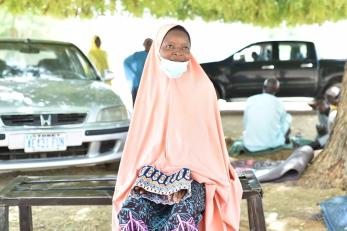Youth livelihood intervention provides a ray of hope for Hajartu’s family

Hajartu is poised and still, with a huge smile and small gestures of her hands as she speaks. We are in front of her home, with sounds of her family’s life—children playing in the background, water splashing as the local water vendors serve a nearby household—clattering in the background and the odd goat or chicken trotting past her feet.
Hajartu Saidu Abubakar and her family routinely fled into the bush when Boko Haram would come through their village, Gadaka Village of Fika LGA, to raid homes for food. Then the group became more destructive and began killing people in 2014. One day her father saw smoke rising from a nearby community, he knew they had to flee for good. Hajartu's parents made sure she and her four siblings had a spot in a caravan of vehicles that were leaving for safety in Potiskum, where they have lived for seven years as internally displaced persons in Barebari Bauya community.
As the family tried to settle into their new reality, things became very difficult. Especially for Hajartu’s father who was a farmer but could not continue due to access to land for cultivation. Her parents tried to adapt and resulted to petty trading (sale of vegetables) in front of their home.
Hajartu, now 20-years, told us how she participated in vocational skills training, through the Building Resilience in Complex Crisis (BRICC) program, and learned how to make male caps, sewing, and knitting which are a demand-driven enterprise in Yobe state. Even without receiving a start-up grant after learning these vocational skills, Hajartu kept on learning from her artisan in order to be skilled in her vocation. She then began making caps to sell in the market, which she confirmed has been earning her substantial income that she uses in supporting her family.
On average, she sells baby knitted caps for 300 Naira and adult caps for 4000 Naira each. Hajartu noted that with these skills and other lessons she had put into practice, things have begun to change for the better. “I am very grateful to the European Union for funding Mercy Corps BRICC program, the skills I have learned is helping me to support my family meet some basic needs, empowers me and makes me less vulnerable to social vices of life”, she shares on the impact the intervention had on their lives.
About BRICC
The Building Resilience in Complex Crisis (BRICC) is a European Union funded program implemented jointly by Mercy Corps, Danish Refugee Council (DRC) and Cooperazione Internazionale (COOPI). The program aims to build the adaptive resilience capacities of 26,875 households (6,719 men, 6,719 women, 6,719 male youth, and 6,718 female youth) identified as vulnerable members of 30 target communities in six LGAs (Damaturu, Potiskum, Geidam, Yunusari, Gujuba and Gulani) of Yobe State by increasing their ability to cope with the shocks and stresses of conflict, climate change, and complex crisis, and their ability to transform the underlying causal dynamics to reduce the risk of future conflict for a period of three years (April 2019 – April 2022). In addition, six vocational skills centers, financial institutions, government actors, 30 community resilience groups (CRG), 600 community leaders, 248 savings and loan groups, 248 farmer’s associations, and 2 local civil society organizations will benefit from the action.